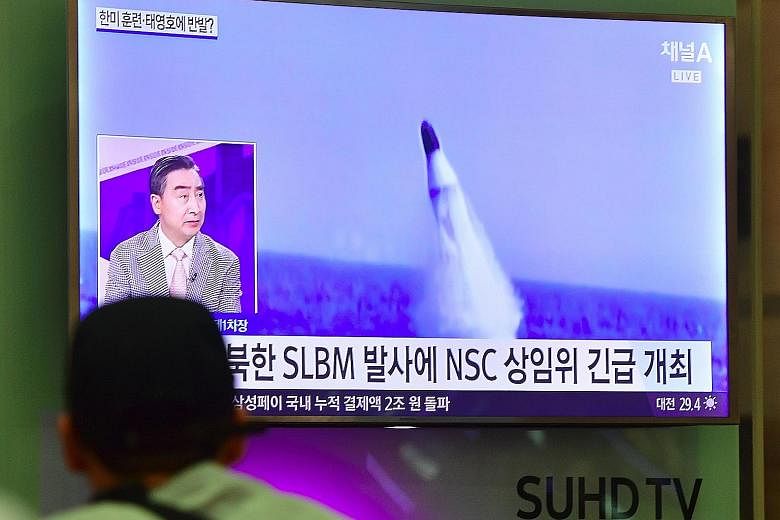North Korea yesterday shot a submarine-launched ballistic missile that flew 500km towards Japan in the latest in a series of provocative missile tests conducted in recent months.
The projectile breached Japan's air defence identification zone, which is the area of control designated by countries to help maintain air security, for the first time.
Such missiles may have the capacity to fly more than 2,000km, South Korea's Yonhap news agency said, citing the military.
The foreign ministers of China, Japan and South Korea, meeting in Tokyo for formal talks mere hours after the missile launch, were united in denouncing yesterday's attack.
It came three weeks after the North shot an intermediate-range missile that flew about 1,000km into Japan's waters, which is the farthest in Pyongyang's tests so far.
Yesterday's missile was launched at about 5.30am, local time (4.30am, Singapore time), from near the coastal city of Sinpo, where a submarine base is located. There were no reports of damage to any ship or aircraft in the area, Tokyo said.
Japanese Prime Minister Shinzo Abe told reporters: "This is an impermissible and outrageous act that represents a grave threat to the security of Japan and seriously undermines the peace and stability of the region." He said Tokyo has lodged a strong protest with Pyongyang, and will "take resolute measures - including at the United Nations - in close coordination with the United States, South Korea and the rest of the international community".
North Korea was top of the agenda at yesterday's trilateral meeting chaired by Japanese Foreign Minister Fumio Kishida and attended by his Chinese and South Korean counterparts, Mr Wang Yi and Mr Yun Byung Se.
Mr Kishida said at a joint press conference that the three countries will lead efforts to "urge the North to refrain from provocative acts".
Mr Wang said China opposes North Korea's nuclear and missile programme, while Mr Yun emphasised the "urgency and critical threat" posed by the North, which could conduct more nuclear tests.
North Korea has become further isolated after its fourth nuclear test in January and the launch of a long-range rocket a month later.
Experts noted the added political significance of yesterday's launch, on top of it being an attempt by the North to show off its improved technology capabilities. It came two days after South Korea and the US started annual military exercises that are seen by Pyongyang as a preparation for invasion. Tensions also intensified following the recent defection of a top envoy stationed in London to South Korea.
Dr Lee Seong Hyon, of South Korean think-tank Sejong Institute, told The Straits Times that yesterday's development suggests that the North might be capable of developing a sea-based nuclear deterrent.
"What is worrisome is that the speed of North Korea, whether in missile or nuclear development, has always proven to be faster than what Washington and Seoul have predicted. There must be a way to engage Pyongyang and do something about the situation."

